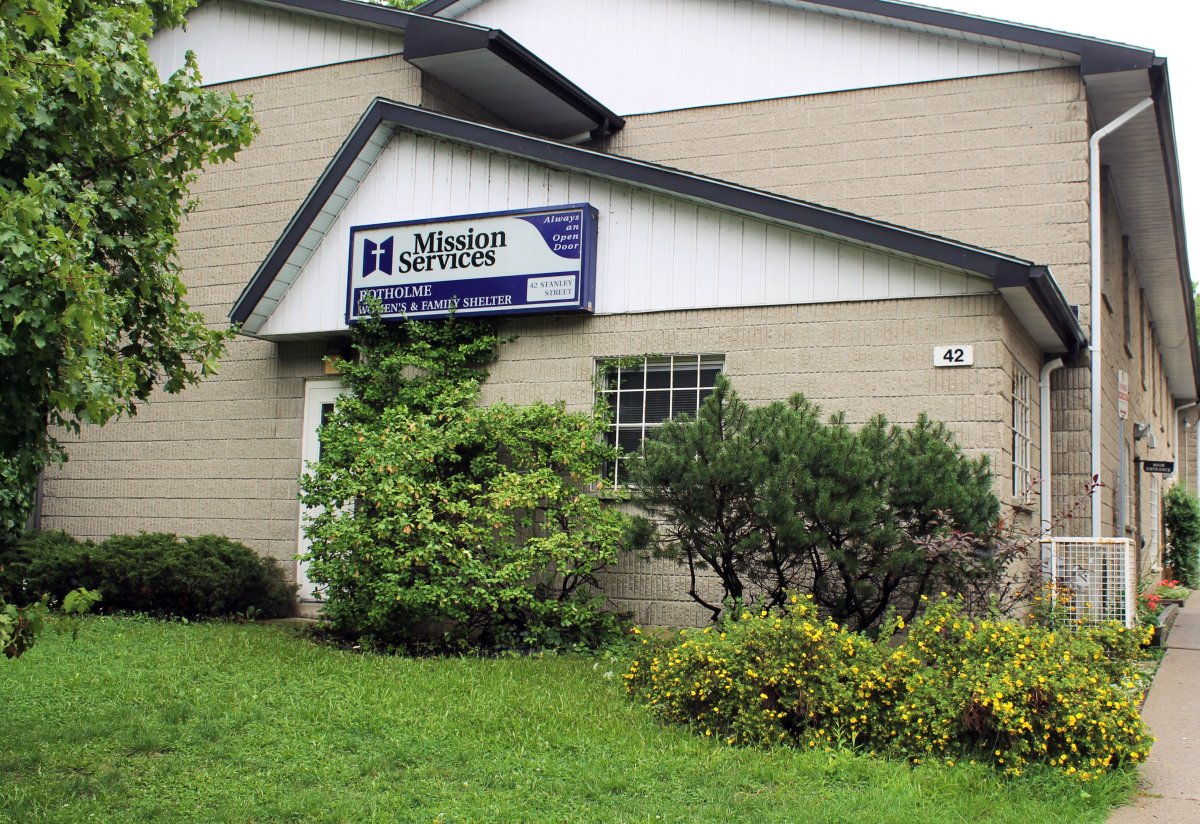Those on the front lines of the coronavirus pandemic are under increased pressure as they adapt the way they operate to prevent the spread of the virus, which is especially true for those working with the most vulnerable.

“The stress and pressure are more, because you’re aware that you’re working in an environment during a pandemic where there is a potential the people you are working with or working to serve may have a virus,” said Gordon Russell, the director of shelters for Mission Services of London, told Global News.
Mission Services of London (MSL) operates Quintin Warner House for treating addiction, Rotholme Family Shelter, and the Men’s Mission, among other services.
“Out people are often people who are already at a significant risk, who are health-comprised and have physical health issues that make them more susceptible,” said Russell, who works with the Men’s Mission and Rotholome Family Shelter.
Reduction in services
“Folks who are on the street have heightened challenges because there are so many services that would be operating right now that aren’t,” Russell said.
He said things like washrooms, where to shower and even going to get food have changed.
Peter Rozeluk, the executive director of MSL, said all of the services the organization offers have had to change amid the pandemic.
- B.C. to ban drug use in all public places in major overhaul of decriminalization
- 3 women diagnosed with HIV after ‘vampire facials’ at unlicensed U.S. spa
- Solar eclipse eye damage: More than 160 cases reported in Ontario, Quebec
- ‘Super lice’ are becoming more resistant to chemical shampoos. What to use instead
Of the 110 shelter beds at the Men’s Mission, MSL has transitioned 35 people into the hotel rooms, which created staffing issues.
“Now basically we’ve got two sites, so now we have to staff two locations,” Rozeluk.
As of last week, MSL was able to “fill in all the pieces” to fully staff all shifts but is still looking to hire more relief staff to cover unexpected and unplanned absences from work
Several weeks back, the City of London’s Homeless Prevention Division started reducing the number of people in shelters by transitioning those most at risk due to the coronavirus to hotel rooms.
There are 205 rooms at six locations across the city currently rented to help shelters physically distance people and isolate them properly. Of those rooms, 25 are set aside for anyone awaiting test results or recovering from COVID-19, and 29 are available for anyone who has been medically directed to self-isolate.
To date, London has only had two homeless people test positive for the coronavirus, who city officials say were not in the shelter system.
Rotholme Family Shelter houses 20 families, and half of those have now been transferred to motel rooms, creating the same staffing issues.
To ensure physical distancing, the Men’s Mission has also doubled the number of meal times it offers and removed chairs so people do not gather.
Mission Services is not the only shelter having to change the way it operates.
Because of the tight quarters at its Dundas location, the Unity Project has moved its operation into a hotel room. In partnership with the city, the organization is using some of the rooms purchased to house homeless people.
On the plus side, Chuck Lazenby, Unity Project executive director said they expanded the number of emergency shelter beds they offer while at the hotel from 37 to 65, but she tells Global News the change has come with its drawbacks.
“We have lost the ability to do drop-in services, and so I think that is something that the community and Old East Village is feeling a lack of,” Lazenby. “The ability to, any time throughout the day, 24 hours a day, be able to walk in our doors, use the washroom, use the shower and speak to staff to get support for any basic needs.”
There have been several potential cases of the virus, but Lazenby said the Unity Project has yet to have anyone test positive.
“People experiencing homelessness have been in a health crisis for decades, and it’s in a pandemic where we are all impacted by a health crisis that shows the inequality that exists towards people living in poverty or experiencing homelessness,” Lazenby said.
Loss of community
For those who were transitioned to the motels, it may not be as welcome as change as people might think.
“Sometimes people find that in a congregate living situation there is a sense of community, people next to you and you know them, and there is something comforting and affirming about that,” Russell said.
Some of the motels are not in areas their clients are used to, which he says can be a challenge.
“There are people that have their own sense of geography and community in the city,” he said.
“To us, that may not make sense, because we think, ‘Wow, you have gone from a shelter in a dormitory with five or six guys, and now you have your own room and washroom,’ but when we say that, we don’t particularity understand the people we are talking about.”
Battling addiction
On top of trying to ensure physical distancing and sanitization, Russell said clients are still facing the same issues they face every day.
“Here we are in the middle of a pandemic where we have a heightened concern for the physical health of everyone, but people struggling with substance abuse do not become secondary or fade away.”
Despite a waitlist, Quintin Warner House put a hold on accepting new clients in mid-March. It was only recently that it started admitting new clients after a new system was put in place.
Before being admitted to the main house, clients are tested and isolated in one of the MSL’s annex houses.
“Addictions, as a health issue, continues regardless of viruses in the environment,” Rozeluk said. “Some might argue that there may be an increase in individuals struggling with addictions as a direct result of the current emergency.”
Personal protective equipment
As the case count rises, Rozeluk said having enough personal protective equipment (PPE) to keep staff safe is still a concern.
“The personal protective equipment has been a challenge to get,” he told Global News.
“We monitor weekly and are still learning from experience on how quickly we use PPE in each of our branches.”
The shelter’s stock is doing ‘OK,’ but for Rozeluk the ideal for would be to have a three-month supply. He said he is thankful for the community donors and staff who are in constant contact with suppliers.
Looking to the future, he said it might become the new normal to have a stock of PPE.
“It may become part of the new normal and prudent to maintain an inventory of PPE in the future. It is something that we and the health-care sector as a whole will have to manage going forward.”








Comments